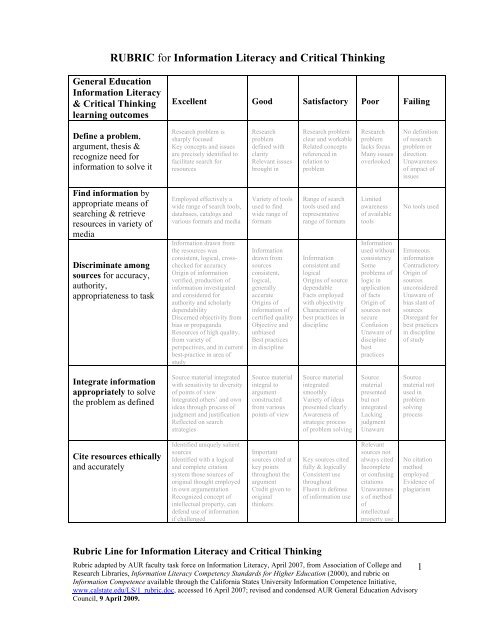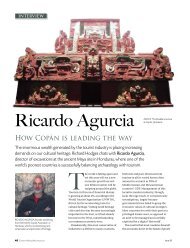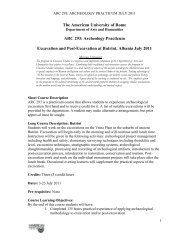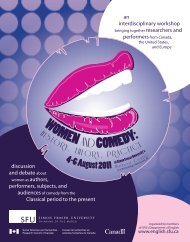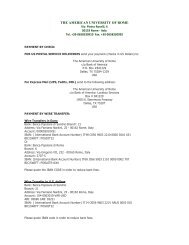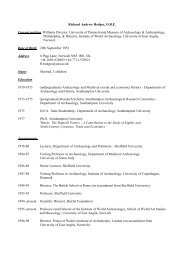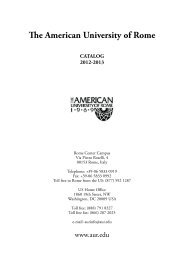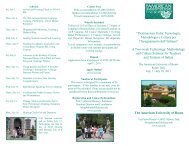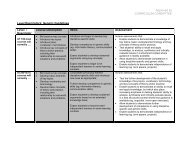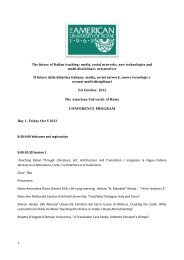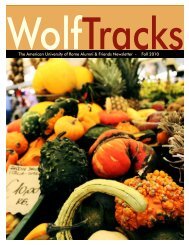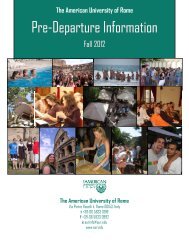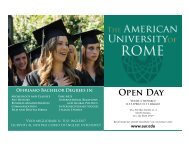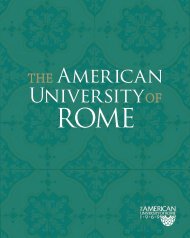Information Literacy and Critical Thinking rubric lines
Information Literacy and Critical Thinking rubric lines
Information Literacy and Critical Thinking rubric lines
Create successful ePaper yourself
Turn your PDF publications into a flip-book with our unique Google optimized e-Paper software.
RUBRIC for <strong>Information</strong> <strong>Literacy</strong> <strong>and</strong> <strong>Critical</strong> <strong>Thinking</strong><br />
General Education<br />
<strong>Information</strong> <strong>Literacy</strong><br />
& <strong>Critical</strong> <strong>Thinking</strong><br />
learning outcomes<br />
Excellent Good Satisfactory Poor Failing<br />
Define a problem,<br />
argument, thesis &<br />
recognize need for<br />
information to solve it<br />
Research problem is<br />
sharply focused<br />
Key concepts <strong>and</strong> issues<br />
are precisely identified to<br />
facilitate search for<br />
resources<br />
Research<br />
problem<br />
defined with<br />
clarity<br />
Relevant issues<br />
brought in<br />
Research problem<br />
clear <strong>and</strong> workable<br />
Related concepts<br />
referenced in<br />
relation to<br />
problem<br />
Research<br />
problem<br />
lacks focus<br />
Many issues<br />
overlooked<br />
No definition<br />
of research<br />
problem or<br />
direction<br />
Unawareness<br />
of impact of<br />
issues<br />
Find information by<br />
appropriate means of<br />
searching & retrieve<br />
resources in variety of<br />
media<br />
Discriminate among<br />
sources for accuracy,<br />
authority,<br />
appropriateness to task<br />
Employed effectively a<br />
wide range of search tools,<br />
databases, catalogs <strong>and</strong><br />
various formats <strong>and</strong> media<br />
<strong>Information</strong> drawn from<br />
the resources was<br />
consistent, logical, crosschecked<br />
for accuracy<br />
Origin of information<br />
verified, production of<br />
information investigated<br />
<strong>and</strong> considered for<br />
authority <strong>and</strong> scholarly<br />
dependability<br />
Discerned objectivity from<br />
bias or propag<strong>and</strong>a<br />
Resources of high quality,<br />
from variety of<br />
perspectives, <strong>and</strong> in current<br />
best-practice in area of<br />
study<br />
Variety of tools<br />
used to find<br />
wide range of<br />
formats<br />
<strong>Information</strong><br />
drawn from<br />
sources<br />
consistent,<br />
logical,<br />
generally<br />
accurate<br />
Origins of<br />
information of<br />
certified quality<br />
Objective <strong>and</strong><br />
unbiased<br />
Best practices<br />
in discipline<br />
Range of search<br />
tools used <strong>and</strong><br />
representative<br />
range of formats<br />
<strong>Information</strong><br />
consistent <strong>and</strong><br />
logical<br />
Origins of source<br />
dependable<br />
Facts employed<br />
with objectivity<br />
Characteristic of<br />
best practices in<br />
discipline<br />
Limited<br />
awareness<br />
of available<br />
tools<br />
<strong>Information</strong><br />
used without<br />
consistency<br />
Some<br />
problems of<br />
logic in<br />
application<br />
of facts<br />
Origin of<br />
sources not<br />
secure<br />
Confusion<br />
Unaware of<br />
discipline<br />
best<br />
practices<br />
No tools used<br />
Erroneous<br />
information<br />
Contradictory<br />
Origin of<br />
sources<br />
unconsidered<br />
Unaware of<br />
bias slant of<br />
sources<br />
Disregard for<br />
best practices<br />
in discipline<br />
of study<br />
Integrate information<br />
appropriately to solve<br />
the problem as defined<br />
Source material integrated<br />
with sensitivity to diversity<br />
of points of view<br />
Integrated others’ <strong>and</strong> own<br />
ideas through process of<br />
judgment <strong>and</strong> justification<br />
Reflected on search<br />
strategies<br />
Source material<br />
integral to<br />
argument<br />
constructed<br />
from various<br />
points of view<br />
Source material<br />
integrated<br />
smoothly<br />
Variety of ideas<br />
presented clearly<br />
Awareness of<br />
strategic process<br />
of problem solving<br />
Source<br />
material<br />
presented<br />
but not<br />
integrated<br />
Lacking<br />
judgment<br />
Unaware<br />
Source<br />
material not<br />
used in<br />
problem<br />
solving<br />
process<br />
Cite resources ethically<br />
<strong>and</strong> accurately<br />
Identified uniquely salient<br />
sources<br />
Identified with a logical<br />
<strong>and</strong> complete citation<br />
system those sources of<br />
original thought employed<br />
in own argumentation<br />
Recognized concept of<br />
intellectual property, can<br />
defend use of information<br />
if challenged<br />
Important<br />
sources cited at<br />
key points<br />
throughout the<br />
argument<br />
Credit given to<br />
original<br />
thinkers<br />
Key sources cited<br />
fully & logically<br />
Consistent use<br />
throughout<br />
Fluent in defense<br />
of information use<br />
Relevant<br />
sources not<br />
always cited<br />
Incomplete<br />
or confusing<br />
citations<br />
Unawarenes<br />
s of method<br />
of<br />
intellectual<br />
property use<br />
No citation<br />
method<br />
employed<br />
Evidence of<br />
plagiarism<br />
Rubric Line for <strong>Information</strong> <strong>Literacy</strong> <strong>and</strong> <strong>Critical</strong> <strong>Thinking</strong><br />
Rubric adapted by AUR faculty task force on <strong>Information</strong> <strong>Literacy</strong>, April 2007, from Association of College <strong>and</strong> 1<br />
Research Libraries, <strong>Information</strong> <strong>Literacy</strong> Competency St<strong>and</strong>ards for Higher Education (2000), <strong>and</strong> <strong>rubric</strong> on<br />
<strong>Information</strong> Competence available through the California States University <strong>Information</strong> Competence Initiative,<br />
www.calstate.edu/LS/1_<strong>rubric</strong>.doc, accessed 16 April 2007; revised <strong>and</strong> condensed AUR General Education Advisory<br />
Council, 9 April 2009.
<strong>Information</strong> <strong>Literacy</strong> & <strong>Critical</strong> <strong>Thinking</strong><br />
learning outcomes Excellent Good Satisfactory Poor Failing<br />
Recognize need for information, find,<br />
discriminate, use <strong>and</strong> cite resources<br />
ethically<br />
Rubric adapted by AUR faculty task force on <strong>Information</strong> <strong>Literacy</strong>, April 2007, from Association of College <strong>and</strong> 2<br />
Research Libraries, <strong>Information</strong> <strong>Literacy</strong> Competency St<strong>and</strong>ards for Higher Education (2000), <strong>and</strong> <strong>rubric</strong> on<br />
<strong>Information</strong> Competence available through the California States University <strong>Information</strong> Competence Initiative,<br />
www.calstate.edu/LS/1_<strong>rubric</strong>.doc, accessed 16 April 2007; revised <strong>and</strong> condensed AUR General Education Advisory<br />
Council, 9 April 2009.


